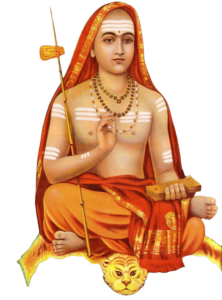Adi Shankara – also known as Shankaracharya – is kind of like one of the OGs of Indian philosophy. He lived way back in the early 8th century, and even though he only lived about 32 years, his ideas ended up shaping how Hinduism looks and feels to this day. Honestly, it’s wild how someone with such a short life managed to leave that big of an intellectual and spiritual legacy.
So, his main thing was a school of philosophy called Advaita Vedanta. “Advaita” literally means “not two,” and that pretty much sums up his worldview. According to Shankara, beneath all the messy differences we see in the world – like people, animals, objects, experiences – there’s just one ultimate reality, called Brahman, and our true self, or Atman, isn’t separate from Brahman at all. Basically, he’s saying the essence of who we are is the same as the essence of the universe. The whole point of life, then, is realizing that truth and breaking free from Maya, or illusion, because, in his view, all the stuff we normally obsess over – status, pleasure, pain, possessions – is temporary and kind of a distraction from what’s real.
Shankara was also a bit of a wanderer. He traveled all across India, debating scholars from different philosophical schools. Back then, debates weren’t just nerdy side hobbies – they were a big deal, like deciding which worldview people would actually follow, and apparently, he was really good at it. The stories say he could break down complicated arguments, flip them inside out, and explain why Advaita Vedanta made more sense than dualistic or ritual-heavy approaches. He wasn’t just throwing around fancy words either; he had this mix of razor-sharp logic and deep spirituality that made people actually listen.
Another huge contribution of his was commentary writing. He wrote these super influential commentaries on important Hindu texts: the Upanishads, the Bhagavad Gita, and the Brahma Sutras. Those are kind of like the core texts of Vedanta philosophy, but before him, they could feel cryptic or contradictory. Shankara’s explanations helped tie them all together under one vision: the unity of Atman and Brahman. Later Hindu thinkers, even those who disagreed with him, had to respond to his interpretations because they became so central.
But Shankara wasn’t just a philosopher locked in books – he also cared about religious practice. He wanted ordinary people to still have a way into spiritual life, so he organized monastic orders and founded four main monasteries (called mathas) in different parts of India. These weren’t just retreat centers – they became like anchor points for spreading and preserving Vedantic philosophy for centuries. The title “Shankaracharya” actually comes from that system: every leader of those monasteries is still called by that name today, kind of carrying on his mission.
 What’s also interesting is how he handled the whole tension between ritual and knowledge. Shankara wasn’t anti-ritual. He recognized that people at different stages of spiritual growth might need concrete practices like prayer, worship, or meditation. But he argued that those practices are like stepping stones – they prepare you for the ultimate realization of oneness. In a way, he was saying: do the rituals if they help, but don’t mistake them for the end goal. The real awakening comes when you fully grasp that you and Brahman are the same.
What’s also interesting is how he handled the whole tension between ritual and knowledge. Shankara wasn’t anti-ritual. He recognized that people at different stages of spiritual growth might need concrete practices like prayer, worship, or meditation. But he argued that those practices are like stepping stones – they prepare you for the ultimate realization of oneness. In a way, he was saying: do the rituals if they help, but don’t mistake them for the end goal. The real awakening comes when you fully grasp that you and Brahman are the same.
If you think about it, his philosophy has this almost minimalist vibe. Like, he’s stripping away all the layers we normally build around identity and meaning, and telling us the deepest truth is actually the simplest: unity. That message ended up making Hinduism more philosophical and less about just ritual or mythology. And it also gave it a way to dialogue with other religions and philosophies, because Advaita is both mystical and super logical at the same time.
In the end, Shankara feels like one of those rare people who’s both a genius thinker and a spiritual guide. He managed to give Hinduism a kind of intellectual backbone while also keeping it deeply spiritual. And even though he lived over a thousand years ago, his ideas about unity, illusion, and the search for truth still resonate today. Like, in a world where everyone feels so divided and caught up in differences, Shankara’s reminder that underneath it all, we’re not separate at all, feels pretty powerful.


